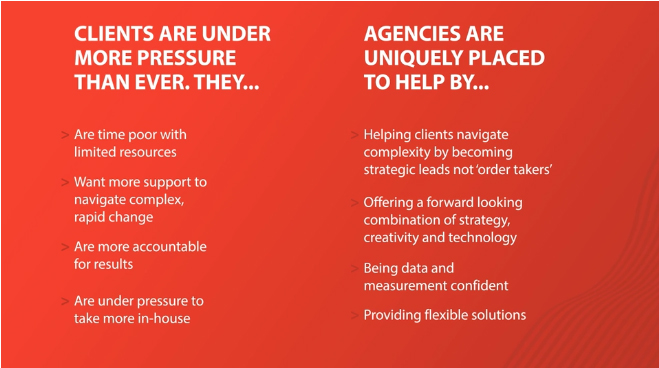The modern CMO must shine in an ever-changing and increasingly challenging workplace, in a role that is in a constant state of flux. Essentially, it’s because of Big Data – customer expectations and technological innovation are combining to pile the pressure on marketers to showcase skills that were never required of them just a few years ago. How do they feel and how do they cope? Jamie Matthews shares some expertise and some survival tips:
What will marketing look like in the future? Who will be leading it? What kind of partnerships will prevail?
These are crucial questions facing brands today. As the future unfolds, it is up to business leaders to ensure they are prepared.
For many businesses, change is well under way. For instance, in recent years we have seen shuffling among the C-Suite. There are new roles being created – such as chief customer officer and chief experience officer – as businesses adapt to a consumer-first world, while the lines between traditional roles are blurring. The role of the chief marketing officer (CMO), in particular, is undergoing a major shift as CMOs need to take on duties more usually associated with the chief technology officer (CTO) or chief information officer (CIO).
Put simply, the reason for this shift is technology. Big Data, evolving customer expectations and world-changing technological developments are all cited as the main reasons why, more than ever, CMOs are experiencing an increasing pressure to own and showcase skills that would never have been thought of as falling within their remit just five years ago.
The challenge is palpable. For current CMOs, technology can even be perceived as a threat to their job security. Technology waits for no-one and CMOs must work faster and harder than ever before. For instance, a new report published by IBM Institute for Business Value highlighted that companies that have outperformed their peers (according to a broad range of financial measures) are more likely to believe they are ready to adopt cognitive computing (88%) than other companies (57%). They are also more likely to believe that the technology will be important to the organisation’s future. These findings indicate a clear and growing need for marketers who want to push their companies forward to understand and get behind new and evolving technology.
So, how can they remain relevant?
The marketing industry is moving quicker than ever. We were involved in research by the MAA, among other agencies, to discover what we must do to stay ahead. Among many insights, we found that the traditional role of the CMO is evolving at speed – and it’s up to agencies to help them navigate these times of change.

Four months of intense research across the industry by the UK’s MAA (Marketing Agencies Association) revealed how agencies plan to remain relevant and competitive in an ever-changing and challenging landscape of innovation. Click this image for more information – and watch the video below.
Of course, one of the most compelling things about a career in marketing is that the industry has never been fearful of change. We thrive on it. Instead of feeling threatened, CMOs should use it as an opportunity to embrace exciting new responsibilities that, ultimately, will position them as being completely indispensable to the success of their business. Never before have CMOs had a better chance to embed themselves across entire operations, ensuring total alignment with the brand agenda.
Modern skills of the chief marketing officer
In practice? There are a number of skills and characteristics that CMOs can – and should – start adopting right now, to ensure they are not just fit for the future, they are creating it.
- Be a great conversationalist
As the breadth of their responsibility grows, CMOs need to be adept and expert conversationalists. In a career built on communication, this is nothing new; but what has changed is the variety of teams and individuals that CMOs need to interact with effectively. They also need to be able to inspire and encourage others to communicate in the same way. There was a time when different departments in any business were siloed. The marketing team and tech workers could not have been further removed from each other. Today, as marketing plays a more pivotal role, it is up to the CMO to connect people internally. On-trend and on-budget analysis, supported by smart insight and data, will be necessary to navigate the best route to reciprocal communication and successful outcomes.
- Focus on growth and analysis
CMOs already have to be increasingly growth-orientated and analysis-led. Ever-increasing reliance on technology to facilitate this is an inevitable consequence of vital digital transformation. This is a priority in an age when measurement of ROI is both a key indicator of success and data dependent. However, although it is vital for CMOs (and their team) to have a secure grasp of both, these are also individual specialisms in themselves. As well as huge databases, multiple channels – from traditional print and TV to online, social media, augmented and virtual reality (AR and VR) – must also be managed by the modern CMO. Simply keeping abreast of what is, or is just about to be possible is a huge task. CMOs now sit at the summit of a technical, technological and acronym-littered mountain. Although this is a challenging environment, this is exactly where the most effective leaders need to be.
- Embrace complexity
Technology now influences even the age-old marketing problem of cultivating and retaining loyal customers. As the role of CMO becomes more complex, so too does the marketplace. Clients and customers have an ever-expanding range of options, meaning it is increasingly difficult to capture and keep their attention. Marketers try to overcome this by striving to produce great and memorable work, but this is only possible when each element is resolved with clarity and expertise, then consolidated. Complexity and choice must be embraced because they open up immediate and exciting opportunities.
- Put the right partners in place
Savvy CMOs know they need to be at the cutting-edge of innovation if they are to create problem-solving strategies. The right agency partner will help them get there. However, unlike the CMO of old, who relied on just two agency partners of advertising and media, today’s CMOs have an increasing number of specialists in their network to help navigate the proliferating choice of channels. At Initials, we have seen increasing client demand for total reliability from agency partners in highly specialised areas of technical expertise. Complexity and innovation have made the ability to offer this non-negotiable. Agencies must be able to share proactive, innovative ideas, provide counsel and have the confidence to challenge the brief.
- Build the best team
Being a leader demands excellence and expertise. But CMOs must recognise that their team is their most valuable asset.
Now, more than ever, to be the best means assembling a mix of generations and talent, aiming for seasoned brains with youthful vigour. Getting the balance right will increase the likelihood of having a happy, vibrant culture and motivated people. It is important to ensure a working environment in which new talent and experience, along with rationality and emotion, can come together to produce brilliant work – and that includes agency partners. Diversifying beyond a single talent pool and making the most of bright freelancers as swift providers of relevant knowledge will help generate rapid, innovative solutions to diverse problems.
The new CMO is different. Where once they looked outwards, laser-focused on the consumer, they now need to be more inward-facing, working to connect people internally across the business. How and when they join forces with agency expertise must also evolve. Creating opportunities for conversations that maximise the usefulness of indispensable, specialist skills must be a priority for this relationship to flourish. Collaboration has never been more critical.
Have an opinion on this article? Please join in the discussion: the GMA is a community of data driven marketers and YOUR opinion counts.






Leave your thoughts